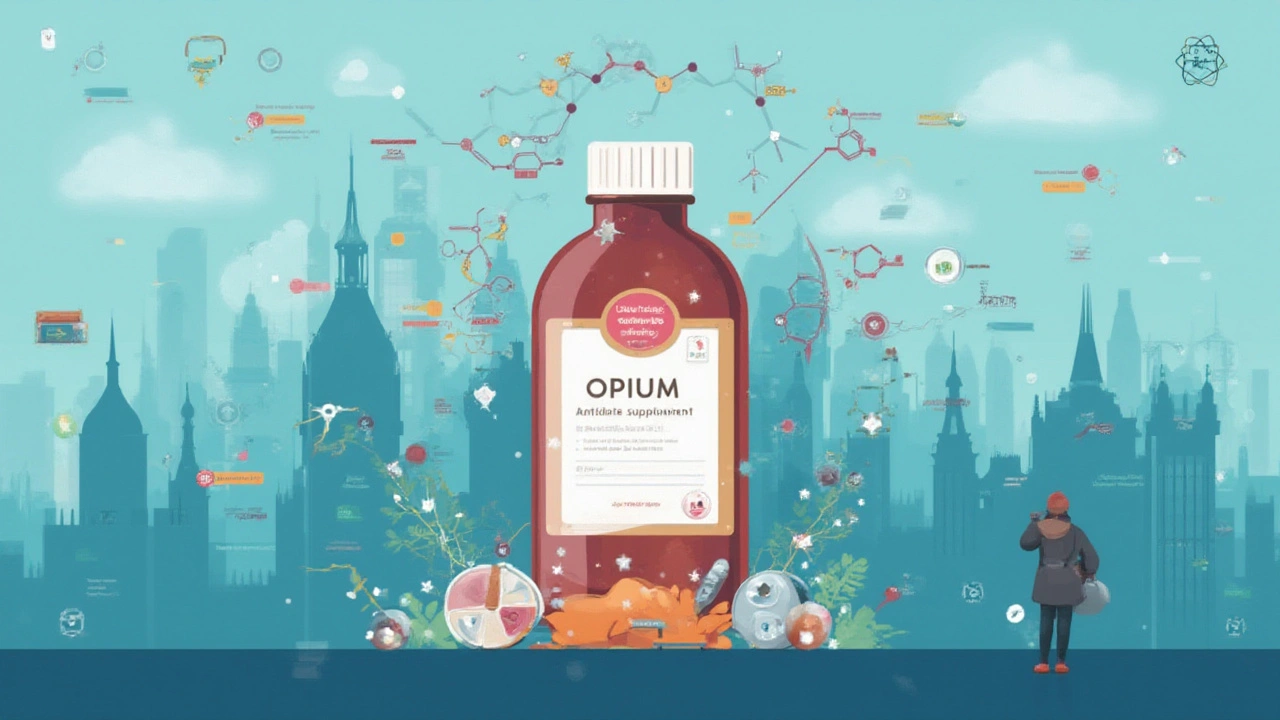Picture this: A tiny bottle labeled "Opium Antidote" sits tucked beside your vitamin C and magnesium in the kitchen. This isn’t some prop from an old Western pharmacy, but a real product you’ll find popping up everywhere. It’s been the talk of every wellness forum since early this year, with people swearing by its powers—while medical experts stare hard at the ingredient list, raising both eyebrows. The idea that a supplement could counteract the side effects (or cravings) of opiates is wild. Even my friend Kayla, who’s usually skeptical of health trends, started adding it to her tea. Does it really do what it claims, or is it just another beautiful bottle of hope?
What Is Opium Antidote and Why Are People Taking It?
This supplement is branded as a natural aid for those wanting to support their bodies through pain relief, anxiety, or even just a rough patch of sleep. The ingredient labels claim "proprietary blends"—think milk thistle, valerian root, magnesium, ashwagandha, plus some adaptogenic mushrooms. The real hook, though, is the promise: helping your body gently detox, reset neurotransmitters, and manage the after-effects of opiate use. Some even market it for "natural pain support" for people dealing with minor chronic pain issues who want to avoid prescription painkillers. That’s how it rocketed into TikTok reels, late-night podcasts, and even the local health food shop’s best-selling shelf by March 2025.
But if you dig into the files, you see a few things. First, the phrase "opium antidote" might give grand expectations, but this isn’t a magic bullet. None of the available formulas contain what your ER doctor would prescribe for an actual overdose (like naloxone). Instead, these are blends of liver-supporting herbs, soothing roots, or adaptogens associated with mental focus and calm. The marketing genie has done a good job making it sound like you’ll feel brand new overnight—but chat with a pharmacist or any doctor, and they’ll tell you: these supplements may help with mild stress or sleep, but they cannot reverse true opiate toxicity. At best, they might tackle some side effects of withdrawal or cravings when used with lots of other support.
So why are people giving it the time of day? There’s a lot of worry these days about prescription dependency. I’ve got friends who can’t sleep after minor surgery because they’re nervous about opioids. There’s a strong appeal for "natural" help, especially when you see those TikTok testimonials about people feeling good again after a struggle. Some use it as a kind of “booster” alongside therapy, counseling, or as something to fill the gap between prescriptions. Still, if you scan Reddit threads, plenty of folks use it for migraines, nighttime anxiety, or just to "reset" after a stressful week at work.
One thing nobody really talks about in the hype: Most of these blends aren’t regulated by the FDA in the same way as prescription meds. Actual studies? Pretty thin—and if the brand calls itself "pharmaceutical grade" but only lists herbal extracts, approach with a healthy dose of skepticism. If you’re considering it, step one is always checking with your doctor, especially if you have any sort of liver or kidney problem. Transparency in the supplement world isn’t always as clear as the bottle claims.

The Science (And The Hype) Behind the Supplement
Are there roots in science for these bold claims? Here’s where it gets tricky. The "active ingredients" most often found in opium antidote supplements do come from traditional medicine. Valerian root, for example, is well-known for its sedative effects, handy for sleep issues. Ashwagandha has decades of studies supporting its ability to reduce stress and help balance mood swings; it’s even been researched for lowering cortisol levels. Milk thistle? That’s the liver’s best friend in many herbal medicine playbooks, and at least one 2022 clinical study found it may reduce liver inflammation in patients on multiple medications.
But do these ingredients actually counteract the effects of opiates? Well, not directly. What they may do is support the body as it comes off painkillers—soothing nerves, helping sleep, maybe calming the queasy stomach. Some reviews mention the supplement helps with restless legs or "the old gnawing bone ache" during withdrawal, but those are anecdotal stories rather than hard science. The magic word here is opium antidote, which sounds a lot more aggressive than the science supports. None of the humanitarian groups working with opioid addiction recommend herbal blends as the main treatment.
For addiction recovery, medical consensus always puts therapy, medical support, and sometimes medication-assisted treatment (like suboxone or methadone) at the front of the line. Supplements can play a supporting role, mainly as part of sleep routines, or to give the immune system a tiny extra boost. There’s no published, peer-reviewed data showing that opium antidote supplements are a safe substitute for actual antidotes. If you or someone you love is struggling, the best first step is always to reach out to a medical professional before reaching for a bottle on the store shelf.
During the past few months, I chatted with a former pharmacist I know—she’d just helped with a local addiction intervention group. Her take? "If someone is just tired, anxious, or can’t sleep, herbal remedies might help take the edge off. But no herbal combo is going to save someone from serious withdrawal symptoms or an overdose. I wish folks knew that before they bought any supplement with a fancy name.” There are exceptions, of course—maybe someone just needs extra magnesium or valerian for sleep—but that’s miles away from a medical antidote.
On the bright side, there isn’t much evidence of harm from these herbal ingredients—assuming you aren’t combining them with other meds that can tax your liver or kidneys. Still, watch out: some folks are super sensitive, especially if they have allergies or existing medical conditions. And please, never use any supplement as an excuse to skip proven treatments. The hype might sell bottles, but your health decisions are worth slowing down for.

Smart Ways to Approach Opium Antidote and the Supplement Craze
So, should you give this next wellness trend a try? Here’s the honest approach I’ve taken in my own family. Jasper once complained of muscle aches after a tough hike, and he asked if he should try the opium antidote supplement from the online sale. We looked at the ingredients together, checked the manufacturer’s background, and had a quick video call with our healthcare provider. Linden had fun reading the oddly mystical-sounding herbal names out loud, but my inner mom alarm pinged: new supplements always deserve caution.
- Always research: Don’t stop at the label—search the actual company, double-check their certifications, and look for user reviews across platforms (not just insta-perfect testimonials). If the company won’t answer basic questions about sourcing or batch testing, skip it.
- Ask your doctor or pharmacist: Mixing supplements with prescription meds can lead to weird side effects—especially if you’re already on something for anxiety, sleep, or pain. Share the supplement facts sheet with your healthcare provider before adding anything new to your routine.
- Check for drug interactions: Valerian and ashwagandha, for instance, can make sedating meds more powerful, which is risky for people sensitive to drowsiness. Milk thistle can mess with how your body processes certain drugs in the liver. The last thing you want is to endanger your health for a bottle of promises.
- Ignore miracle claims: If someone says their product will "cure addiction overnight," run the other way. Look for companies that admit what their product can—and can’t—do. Supplementation can be supportive, not curative.
- Be vigilant for side effects: Unusual headaches, nausea, or mood swings? Stop using immediately. Everyone reacts differently, especially if you have allergies or ongoing health issues.
- Keep your expectations realistic: Supplements are an extra—sort of like a rain jacket, not a full shelter. Focus on real-life supports: good nutrition, counseling, medical supervision, and community.
As fascinating as the opium antidote supplement trend is, anchoring your choices in reality pays off. You want the best for yourself and your family, so stay nosy, ask questions, and listen to your body (and your doctor) first. I’ll admit, the idea of a natural helper is appealing, but I’d rather stack my chances on things with decades of real evidence. That said, having a strong herbal tea with Linden on a rainy Sunday does wonders for my mood—and that’s a supplement anyone can get behind.







Evelyn Shaller-Auslander
July 15, 2025 AT 14:56i tried this stuff after my surgery and honestly it helped me sleep better than the weird pills they gave me
not a miracle but i didnt feel like a zombie anymore
Gus Fosarolli
July 16, 2025 AT 01:54oh great another bottle labeled "opium antidote" that’s just valerian root with a fancy logo and a 300% markup
next they’ll sell "caffeine antidote" made of water and regret
Jill Ann Hays
July 16, 2025 AT 10:24The notion that botanical extracts can pharmacologically reverse opioid receptor binding is biologically implausible
The marketing exploits neurobiological illiteracy and capitalizes on societal distrust of institutional medicine
Herbal adaptogens modulate stress response pathways not opioid receptor antagonism
This is not medicine it is semiotic placebo
Mike Rothschild
July 17, 2025 AT 17:44Look I get why people turn to this stuff
Doctors don’t always have time to explain alternatives
But if you’re dealing with real withdrawal or chronic pain
Supplements won’t cut it
They might help you feel a little calmer at night
But they won’t stop seizures or prevent overdose
Talk to a real provider before you risk your health on a label
Kristy Sanchez
July 17, 2025 AT 22:51so let me get this straight
people are drinking ashwagandha tea to "detox" from opioids like it’s a cleanse from gluten
and the same folks who think the moon controls their period think this is science
the fact that this is trending on TikTok while real MAT programs are underfunded is tragic and hilarious
also why does every supplement now have "mushrooms" in it
are we all just trying to become fungi now
Michael Friend
July 18, 2025 AT 00:35the fact that someone actually believes a bottle of tea leaves can replace naloxone is proof the internet is dying
you people are out here treating herbal blends like they’re emergency medicine
next you’ll be using essential oils to treat sepsis
and then you’ll blame the hospital when you die in the waiting room
the marketing is evil and the consumers are gullible
there is no hero here except the pharmacist who quietly shakes their head
Jerrod Davis
July 18, 2025 AT 12:05While the utilization of phytochemical adjuncts may provide ancillary symptomatic relief in the context of opioid withdrawal syndromes, the nomenclature "opium antidote" constitutes a demonstrable misrepresentation of pharmacological function.
Regulatory oversight remains insufficient to mitigate consumer misperception.
It is therefore incumbent upon the medical community to engage in public education regarding the distinction between supportive care and therapeutic intervention.
Further, the commodification of neurobiological distress through aestheticized wellness branding represents a concerning ethical regression in public health discourse.